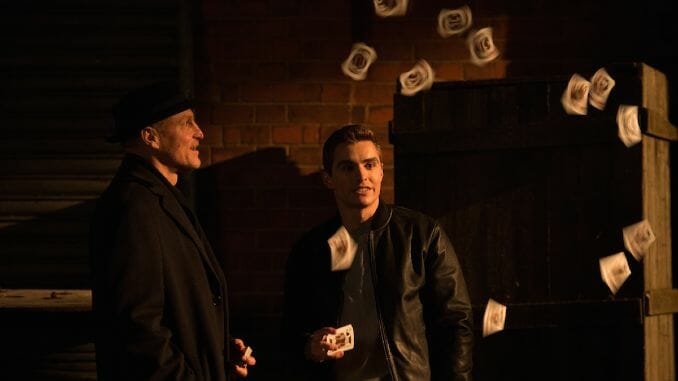The Endearingly Earnest Appeal of Now You See Me‘s Literal Movie Magic

Imagine, if you will, a world where magicians are the single hottest form of live entertainment. Where magicians are a massive cultural phenomenon. Where every single person on a city street, young or old, wails wildly and clutches their chests when a magician suddenly appears to perform a pop-up show. Of course, this is all because the magicians in question are master criminals who expose the corrupt and steal from the rich, sharing their massive fortunes with the common folk like a group of Robin Hood Houdinis. This is the world that was envisioned by screenwriters Boaz Yakin and Edward Ricourt, who co-wrote the script for Now You See Me, the first film in the series about magician criminals, alongside Bill & Ted and Men in Black writer Ed Soloman.
This world seems better, simpler than our own—magicians are important, even necessary cultural figures, capable of enacting structural change on a wide scale, who are led by a shadowy Illuminati-esque organization that believes magicians hold some greater purpose. In this world, magic acts draw fawning crowds of thousands outside of Las Vegas residencies. Most important to the narrative, however, is that the art of sleight-of-hand deception and trickery can be used to engage in criminal activity on an immense international scale, then to defensively ward off the FBI—or, in one of the film’s most ludicrous sequences, to fling standard playing cards like paper cut-inducing ninja stars. There’s a time-honored tradition of trying to make magic cool, and it reaches its apex with the Now You See Me series. In my head, the films are like the cinematic equivalent of the word “himbo”—dumb, hunky, but ultimately harmless and sweet. That’s the Now You See Me films: A harmlessly stupid and wildly fun series that’s trying very hard to be cool, striving for something along the lines of a magician-centric Oceans franchise, mixed with Mr. Robot and National Treasure.
Five years ago, Now You See Me 2, was released in theaters. It has received light taunting over the years following its release for the glaringly obvious missed opportunity of naming the film Now You Don’t to finish off the classic phrase from which the titles of the films derive. This clever wordplay was apparently initially intended by Soloman, but he revealed that the idea was scrapped by marketing. The final decision fits like a perfect puzzle piece into the whole vibe of the ridiculous series, to the point where calling the sequel Now You Don’t would have robbed the films of their dumb, timeless charm (albeit, save for a transphobic joke in the first film). While operating on the same frequency as the long-running Fast and Furious franchise and the ultimately discarded sincerity of Zack Snyder’s vision for Justice League, the Now You See Me films not only embrace a similar earnestness that’s all-too infrequent in goofy, modern blockbusters, but apply it to a concept as deranged as magician anarchists. Like Snyder and his beloved superheroes, there is a sweetness to the concept of making audiences take something ridiculous—like magic—very seriously.
-

-

-

-

-

-

-

-

-

-

-

-

-

-

-

-

-

-

-

-

-

-

-

-

-

-

-

-

-

-

-

-

-

-

-

-

-

-

-

-








































